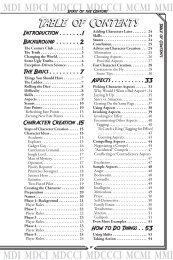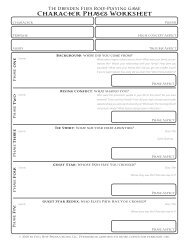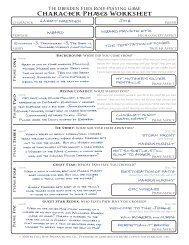Pace And Other Systemsâ¦.. - Evil Hat Productions
Pace And Other Systemsâ¦.. - Evil Hat Productions
Pace And Other Systemsâ¦.. - Evil Hat Productions
- No tags were found...
Create successful ePaper yourself
Turn your PDF publications into a flip-book with our unique Google optimized e-Paper software.
To Fiat or Not To FiatOne of the essential dilemmas for a diceless GM(or a rules-light GM) is balancing the player-heldsense of fair play and decisionmaking against theneed or desire to declare (or mandate) a storyevent or circumstance.This is another place where the pip mechaniccan be your friend. Combine it with the overallconcept of the degree of success, and youve gota pretty good sense of how much it should costyou as a GM to declare so mote it be. <strong>And</strong> ifyoure going into a deficit to do it, all the better your players then get to walk away gettingpaid for the trouble youre causing them.As a rule, in the interests of fairness, its entirelyappropriate to decide that the GM should alwayspay pips in order to make anything of significancehappen. Or more simply: When in doubt, buy it.Minor stuff is much like a basic success, costingone or perhaps two pips. Major circumstancesshould hover around four. Global ones start atsix.Example: The CliffhangerThe group is about approaching their time limiton gaming for the evening, and the GM still hasa pile of ten pips on the table in front of himdue to a round of runaway deficit spending inthe eleventh hour. He decides to spend themin order to set up the circumstances for the nextsession.You are summoned before the king, he says,and drops two pips into the bowl to allow forthis particular fiat. He demands an explanationfor why you attacked the Count.The players make their explanations, but theGM responds with, The King is having none ofit, and drops another two pips into the bowl, tocover his determination of the Kings reaction.He declares you criminals and has youstripped of your weapons. The curtain closeswith you all being led off to the dungeon inchains pending trial. This last bit is huge, andPACE16changes a lot about the story thats to be told.It affects everyone fairly completely its aglobal circumstance in that regard, and thusthe final six pips the ones the players gavehim over the course of the big fight against thecount go into the bowl.Sizing Your AdventureConstructing an adventure peopled with appropriatelysized threats and challenges should be afairly easy exercise in <strong>Pace</strong>, since you can probablyfit everyones character sheets on a singleindex card (a practice I would recommend forgeneral GMing convenience).You should start out by doing some simple math.Whats the total potency of the party? Whatsthe average potency of their descriptors? Whatseach characters highest-rated descriptor?The numbers that come out of this can be used asguidelines for creating your NPCs (above). Further,the thinking that is described in To Fiat orNot To Fiat translates pretty well into a rubric forconstructing an adventure.As a general rule, an adventure built out of asmany pips as the players have potency will bepretty competitive. Consider each mook tobe a minor circumstance (costing 1 or 2), eachnamed character to be a major circumstance(costing 4), and the big bad to represent a good 6to 10 of the pips by himself.If there are some non-NPC obstacles in the way,those should be rated as well. If the PCs have tostage an assault on a protected mountain fortress,thats a pretty major circumstance, and should costyou four.If you find you havent spent all your pips to constructthe adventure, fine; thats your starting poolas a GM. Similarly, if youve overspent, youvedone some deficit spending that should go into thepools of the players theyll need it.You may also wish to defer some of your deficitspending until certain elements come into play.






